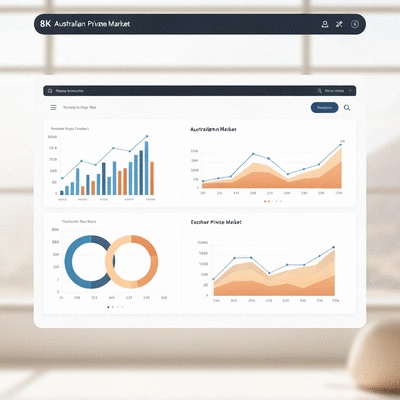As the landscape of Australia's private markets evolves, understanding key trends is essential for investors seeking to diversify and grow their portfolios. Are you ready to navigate this dynamic environment?
What You Will Learn
- The rising interest in private equity and venture capital sectors, highlighting new investment opportunities.
- The importance of sustainable and impact investing as pivotal trends influencing decision-making.
- How democratization through online platforms is making private investments accessible to retail investors.
- The role of technology and AI in enhancing investment strategies and risk assessment.
- Key economic indicators that affect private market performance, including interest rates and inflation trends.
- Practical steps for making informed investment decisions in private markets, including effective research and risk assessment.
Key Drivers and Future Investment Trends in Australia's Private Markets
This visual highlights the primary factors fueling growth in Australia's private markets and emerging investment trends for 2025 and beyond. For a comprehensive overview of broader economic shifts, consider exploring Australia's Market Trends for 2025.
Key Drivers of Growth
- ➤Democratization of Markets
- ➤Role of Technology & AI
- ➤Impact of Economic Indicators
Investment Trends to Watch (2025+)
- ▶Sustainability Focus (ESG)
- ▶Technological Advancements
- ▶Global Economic Shifts
- ▶Diversification Strategies
Informed Investment Decisions
- ■Thorough Research
- ■Engage with Experts
- ■Assess Risk Tolerance
- ■Diversify Investments
Understanding Australia’s Private Markets Landscape
As we delve into Australia’s private markets landscape, it’s essential to recognize the dynamic factors shaping this environment. With my experience at Business Current, I’ve witnessed a captivating shift in investment strategies and opportunities that both retail and institutional investors must understand. Let’s explore the current investment climate and the key drivers propelling growth in private markets.
Current Investment Climate in Australia’s Private Markets
The Australian private markets have been experiencing significant changes due to evolving economic conditions and investor interests. This climate presents a wealth of opportunities for those who can navigate its complexities. Understanding these trends is crucial for anyone looking to invest wisely.
Market Overview: Trends and Opportunities
- Increased interest in private equity and venture capital sectors.
- Growing focus on sustainable and impact investing.
- Emergence of new platforms democratizing access to private investments.
These trends are not just buzzwords; they reflect a fundamental shift in how investments are approached. As private markets become more accessible, investors are finding ways to diversify their portfolios beyond traditional avenues.
Resilience of Private Capital Funds in Volatile Times
In times of economic uncertainty, private capital funds have demonstrated remarkable resilience. Unlike public markets, private investments often weather financial storms more effectively. This stability attracts investors looking for alternatives in times of market volatility, allowing them to preserve capital while seeking growth. For leadership strategies that thrive in uncertain environments, explore Adaptive Leadership for Business Success.
Understanding the long-term potential of private capital can position investors favorably as they plan their strategies. The adaptability of these funds contributes to their ongoing appeal, making them a crucial component of any robust investment portfolio.

Key Drivers of Growth in Private Markets
Several factors are catalyzing the rapid growth of private markets in Australia. These drivers not only enhance investment options but also redefine how investors engage with the markets. Let’s take a closer look at what’s fueling this growth.
Democratization of Private Markets: Accessibility for Retail Investors
- Emergence of online investment platforms.
- Regulatory changes making private equity more accessible.
- Increased financial literacy among retail investors.
The democratization of private markets means that more individuals can participate in investment opportunities that were once reserved for institutions and high-net-worth individuals. This shift is empowering a new generation of investors to explore private asset classes.
The Role of Technology and AI in Shaping Investment Strategies
Technology, particularly artificial intelligence, is playing a pivotal role in transforming how investments are managed. AI-driven analytics provide deeper insights into market trends, helping investors make more informed decisions. This technological integration allows for enhanced risk assessment and strategy refinement. To delve deeper into how AI is transforming various sectors, read about AI's Role in Australian Business.
As we continue into an era defined by digital transformation, leveraging technology will be essential for navigating the complexities of private markets successfully.
Impact of Economic Indicators on Private Market Performance
- Interest rates and their influence on borrowing costs.
- Inflation trends affecting asset valuations.
- Global economic shifts impacting local markets.
Economic indicators serve as a backdrop against which private market performance can be assessed. Investors must stay attuned to these signals to adapt their strategies accordingly and seize opportunities as they arise. Understanding these metrics will help investors forecast market movements and adjust their portfolios effectively.
Engage With Us!
As we dive deeper into the dynamic world of private markets, we want to hear from you! What investment trends are you most excited about for 2025 and beyond? Share your thoughts below:
Summarizing Key Insights and Future Outlook
As we look ahead, it's essential to grasp the key insights from Australia’s evolving private markets. These insights not only inform our understanding of past trends but also guide our future investments. With a landscape that's rapidly changing, we need to be proactive in recognizing patterns and adapting strategies. What will the future of private markets hold for us?

In the coming years, we can expect significant shifts, particularly in areas like private equity and venture capital. By staying informed, we can anticipate changes and position ourselves to take advantage of new opportunities.
Investment Trends to Watch in 2025 and Beyond
When considering future investment landscapes, we must pay attention to emerging trends. Let's explore some pivotal factors expected to influence Australia’s private markets:
- Increased focus on sustainability: With a growing emphasis on ESG (Environmental, Social, and Governance) criteria, investors will likely lean towards sustainable options.
- Technological advancements: The integration of AI and data analytics is reshaping how investments are evaluated and managed.
- Global economic shifts: Changes in international trade agreements and economic stability can impact investment flows.
- Diversification strategies: Investors will increasingly diversify portfolios to mitigate risks associated with market volatility.
These trends outline a dynamic environment that requires agility and foresight. As we navigate this landscape, understanding these predictions can provide a competitive edge.
Forecasting the Evolution of Australia’s Private Markets
Over the next few years, we expect the Australian private markets to evolve dramatically. The demand for private equity and venture capital is likely to grow, driven by innovative startups and the need for flexible funding options. By recognizing the potential for diversification and the importance of technology in investment decisions, we can better prepare for these changes.
Moreover, we're already seeing a shift in investor demographics. As younger generations become more involved in investing, their values and preferences will shape the market’s direction.
Market Analysis: Trends and Predictions in Private Equity and Venture Capital
Private equity is expected to face both challenges and opportunities. Increased competition for quality assets may drive valuations higher. However, innovative sectors such as technology and renewable energy will likely attract substantial investments, offering promising returns.
In venture capital, we'll see a stronger push towards startups focusing on sustainability and social impact, reflecting a broader societal trend. It’s essential for investors to stay attuned to these shifts, as they can inform strategic decision-making and open new avenues for growth.
Making Informed Investment Decisions in Private Markets
For anyone considering entry into private markets, knowledge is power. Here are some practical steps to ensure informed investment decisions:
- Conduct thorough research: Understand the landscape, key players, and market dynamics.
- Engage with experts: Leverage insights from financial advisors and industry leaders to refine your strategies.
- Assess risk tolerance: Consider your comfort level with the inherent risks of private investments.
- Diversify investments: A well-rounded portfolio can help mitigate potential losses.
By following these steps, investors can navigate the complexities of private markets with greater confidence and clarity.
Asset Allocation Strategies for Diversifying Investment Portfolios
Effective asset allocation is crucial in today’s market environment. Here are some strategies to consider:
- Balance between equity and fixed income: Allocate funds across various asset classes to spread risk.
- Incorporate alternative investments: This includes private equity, venture capital, and real estate for potential higher returns.
- Review and adjust regularly: Continually assess your portfolio’s performance and adjust allocations based on market conditions.
By diversifying your portfolio, you can enhance your potential for returns while managing risk more effectively. Remember, it's about finding a balance that aligns with your investment goals and risk appetite.
Engaging with Expert Insights and Resources
Where to Find More Information and Guidance
As we venture further into private markets, accessing accurate information and expert guidance becomes paramount. Here are key resources to consider:
- Industry publications: Subscribe to reputable financial journals and platforms for the latest insights.
- Networking events: Engage with industry professionals at conferences and seminars to expand your knowledge.
- Online communities: Join forums and groups focused on private market investments for peer support and shared experiences.
Connecting with these resources can provide valuable context and enhance your understanding of market dynamics.
Connecting with Industry Leaders and Investment Communities
Building relationships with industry leaders is crucial for staying informed. Platforms like LinkedIn can be invaluable for connecting with experts and engaging in discussions that shape your investment perspective. Seek out mentorship opportunities or join investment clubs to deepen your network.
Engaging with communities can also provide you with insights that you might not find elsewhere. Remember, learning from others’ experiences can inform your own investment strategies.
Utilizing Financial Advisors for Smarter Investment Decisions
Working with financial advisors can significantly enhance your investment strategy. Here’s how to make the most of this relationship:
- Communicate your goals: Clearly outline your investment objectives and risk tolerance.
- Seek tailored advice: Make sure your advisor understands your unique financial situation.
- Review regularly: Schedule periodic check-ins to discuss performance and adjust strategies as needed.
A good financial advisor can help clarify complex concepts and guide you towards making informed decisions aligned with your goals.
Final Thoughts on Private Market Opportunities
In conclusion, navigating the private markets presents unique opportunities and challenges. The key is to approach investments with a balanced perspective on risks and returns. What strategies can you implement to ensure success in this dynamic environment? By remaining informed and adaptable, you can position yourself for future success.
Embrace the learning journey, connect with experts, and be proactive in your investment decisions. Together, we can explore the vast landscape of Australia’s private markets and uncover the opportunities that lie ahead!
Frequently Asked Questions (FAQs)
What are the key trends shaping Australia's private markets?
Key trends include rising interest in private equity and venture capital, a growing focus on sustainable and impact investing (ESG), the democratization of access for retail investors through online platforms, and the increasing role of technology and AI in investment strategies.
How are private capital funds performing in volatile economic times?
Private capital funds have demonstrated remarkable resilience during economic uncertainty, often weathering financial storms more effectively than public markets. This stability makes them an attractive alternative for investors seeking to preserve capital and achieve growth.
How is technology and AI impacting private market investments?
Technology, especially AI, is transforming investment management by providing deeper insights into market trends through advanced analytics. This helps investors make more informed decisions, enhances risk assessment, and refines investment strategies.
What economic indicators should investors watch in private markets?
Investors should monitor interest rates due to their influence on borrowing costs, inflation trends which affect asset valuations, and global economic shifts that can impact local markets. Understanding these metrics helps in forecasting market movements and adjusting portfolios effectively.
What steps can investors take to make informed decisions in private markets?
To make informed decisions, investors should conduct thorough research, engage with financial experts and industry leaders, assess their personal risk tolerance, and diversify their investments across various asset classes to mitigate potential losses.
Recap of Key Points
Here is a quick recap of the important points discussed in the article:
- Increased Interest: There is a growing interest in private equity and venture capital sectors.
- Sustainability Focus: Investors are increasingly prioritizing sustainable and impact investing.
- Accessibility: New platforms are democratizing access to private investments, allowing more retail investors to participate.
- Resilience of Private Funds: Private capital funds tend to withstand economic volatility better than public markets, making them appealing to investors.
- Technology Integration: AI and technology are transforming investment strategies, enhancing decision-making and risk assessment.
- Economic Indicators: Key metrics like interest rates and inflation trends significantly impact private market performance.
- Future Trends: Emerging trends to watch include a focus on sustainability, technological advancements, and diversification strategies.









